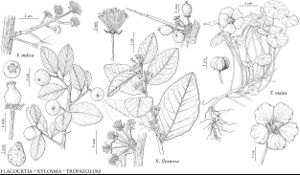Xylosma
Fl. Ins. Austr., 72. 1786.
| Taxon | Illustrator ⠉ | |
|---|---|---|
 | Flacourtia indica Xylosma flexuosa Tropaeolum majus | John Myers John Myers Barbara Alongi |
Shrubs [trees], often ± heterophyllous, not clonal; branching sympodial. Stems usually spinose, sometimes unarmed, spines simple and/or compound. Leaves usually persistent, sometimes ± deciduous (sometimes congested at apices of relatively short lateral branches); stipules absent; petiole not glandular. Inflorescences axillary, fasciculate [racemose], 1 or 2 per axil. Pedicels articulate. Flowers: sepals 4–6 (± persistent, connate proximally, imbricate); disc lobed (lobes extrastaminal, ± confluent [distinct]); stamens [8–] 16–24 [–50+] (usually exserted); filaments distinct; ovary 2-carpellate or 3-carpellate; style indistinct [relatively short]; stigmas 2 or 3, expanded, obcompressed, ± lobed. Fruits baccate. Seeds: aril absent. x = 10.
Distribution
Tex., Mexico, West Indies, Central America, South America, se Asia, Pacific Islands
Discussion
Species 80–90 (1 in the flora).
The infrageneric taxonomy of New-World Xylosma is confused and perplexing. Relatively few characters vary significantly and they seem to do so independently, in a complex pattern of intergrading morphologies. Of species that have been recognized, relatively few are unequivocally distinct.